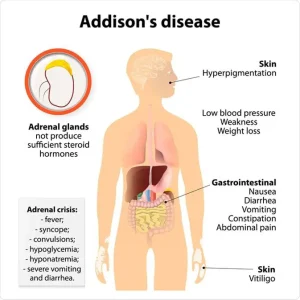Overview
Diagnosis of Addison’s Disease
Diagnosing Addison’s disease involves several steps. Your healthcare provider will start by reviewing your medical history, discussing your symptoms, and ordering specific lab and imaging tests.
1. Blood Tests
-
Measures levels of sodium, potassium, cortisol, and adrenocorticotropic hormone (ACTH).
-
Detects antibodies related to autoimmune causes of Addison’s disease.
2. ACTH Stimulation Test
-
ACTH normally stimulates the adrenal glands to release cortisol.
-
This test measures cortisol levels before and after an injection of lab-made ACTH.
-
A low cortisol response suggests adrenal insufficiency.
3. Insulin-Induced Hypoglycemia Test
-
Used to check for secondary adrenal insufficiency caused by problems with the pituitary gland.
-
Blood sugar and cortisol levels are measured after receiving insulin.
4. Imaging Tests
-
CT scan of the abdomen checks the adrenal glands for size or structural changes.
-
MRI of the pituitary gland helps detect damage causing secondary adrenal insufficiency.
🩺 Early diagnosis plays a key role in preventing life-threatening adrenal crises.
Treatment for Addison’s Disease
Treatment focuses on replacing missing hormones, maintaining fluid balance, and managing symptoms. Most people require lifelong medication and regular monitoring.
1. Hormone Replacement Therapy
-
Hydrocortisone (Cortef), prednisone (Rayos, Prednisone Intensol), or methylprednisolone (Medrol) are used to replace cortisol.
-
Taken on a set schedule to mimic the body’s natural cortisol rhythm.
-
-
Fludrocortisone acetate replaces aldosterone to help maintain blood pressure and electrolyte balance.
2. Sodium Intake
-
Extra sodium may be recommended during:
-
Hot weather
-
Intense physical activity
-
Digestive issues such as diarrhea
-
3. Stress Dose Adjustments
-
You may need to increase your medication temporarily during times of stress such as:
-
Surgery
-
Infections
-
Illness
-
If vomiting prevents oral medication, corticosteroid injections may be required.
Daily Management Tips
-
Carry a medical alert card and bracelet. This helps emergency responders provide the right treatment quickly.
-
Keep extra medicine on hand. Store a backup at work and take it when traveling.
-
Carry an emergency injection kit. This includes injectable corticosteroids, a needle, and a syringe for urgent situations.
-
Stay in touch with your healthcare team. Regular check-ins help monitor hormone levels and adjust doses as needed.
-
Get yearly checkups. Your doctor may also recommend autoimmune disease screening annually.
Addisonian Crisis: A Medical Emergency
An Addisonian crisis can occur suddenly and requires immediate treatment. Emergency care typically involves:
-
Intravenous corticosteroids
-
Saline solution to restore fluid balance
-
Sugar (glucose) to correct low blood sugar levels
🚨 If symptoms of an Addisonian crisis appear — such as severe weakness, confusion, or fainting — seek emergency medical help immediately.
Advertisement

